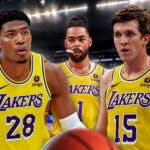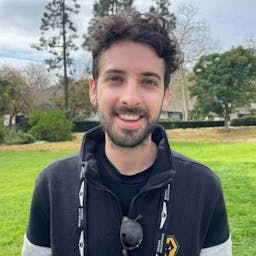LeBron James has no plans to shut up. Based on the way he’s playing in his 18th season, the Los Angeles Lakers star doesn’t seem to have plans to stop dribbling, either.
Following the Lakers’ win over the Portland Trail Blazers on Friday, James ardently clapped back at soccer star Zlatan Ibrahimovic’s comments from Thursday, in which the AC Milan forward criticized LeBron for speaking out on issues beyond basketball.
During an interview for UEFA for Discovery+ in Sweden, the former Los Angeles Galaxy striker praised James’ skills, then opined that the superstar hooper is making the “mistake” of becoming involved with social and political causes.
“[LeBron] is phenomenal at what he’s doing, but I don’t like when people have some kind of status, they go and do politics at the same time,” the 39-year old Swede said. “Do what you’re good at. Do the category you do. I play football because I’m the best at playing football.
“I don’t do politics. If I would be a political politicians, I would do politics. That is the first mistake people do when they become famous and they become in a certain status. Stay out of it. Just do what you do best because it doesn’t look good.”
Zlatan Ibrahimovic uppskattar basketspelaren Lebron James men tycker inte att han ska lägga sig i politiken: "Lebron är fenomenal på det han gör, men jag gillar inte när folk med status lägger sig i politik"
Lång intervju med Zlatan Ibrahimovic: https://t.co/oXm5gjmhKv pic.twitter.com/J3L82GWLD6
— discovery+ sport 🇸🇪 (@dplus_sportSE) February 25, 2021
James has become increasingly outspoken about cultural causes over the past half-decade.
He launched a nonprofit voting initiative, More Than a Vote, has endorsed politicians, called others bums, spearheaded a media platform encouraging athletes to broaden their voices, and has generally been more passionate about racial injustice since the killing of Trayvon Martin.
In 2018, his I Promise School opened in his hometown of Akron, which now provides an education for over 450 kids. He’s also backing projects to provide affordable housing, health care, job training, community centers and more to his native Ohio community.
Minutes after dropping 28 points, 11 rebounds, seven assists, four steals and three blocks on Portland—and his good friend, Carmelo Anthony, who has become an impressive leading activist since he, James, Chris Paul and Dwyane Wade opened the 2016 ESPYs with a powerful call to action—James was noticeably eager to respond to Zlatan.
A loose and jovial James sat down for his postgame Zoom before even putting a shirt on, and he seemed excited to be asked about the striker's controversial take (L.A. broke their four-game losing skid, too, which helped his mood).
“I preach about my people, and I preach about equality,” James said. “Social injustice. Racism. Systematic voter suppression. Things that go on in our community. Because I was a part of my community at one point and saw the things that was going on, and I know what's going on still because I have a group of 300-plus kids at my school that are going through the same thing, and they need a voice. And I'm their voice. I'm their voice, and I use my platform to continue to shed light on everything that may be going on, not only in my community, but around this country and around the world.”
James noted the purchase of the WNBA’s Atlanta Dream by a group including two-time champion Renee Montgomery—the culmination of months-long outcry over former Georgia Senator (and Black Lives Matter objector) Kelly Loeffler’s ownership stake.
(James’ voting group helped turn out tens of thousands of minority voters in Georgia during the recent elections, which undoubtedly contributed to Loeffler’s defeat to Raphael Warnock).
In 2018, James was notoriously demeaned by FOX News anchor Laura Ingraham, who told James to “shut up and dribble,” which became the slogan of Uninterrupted.
“You can just ask Renee Montgomery: if I would have shut up and just dribbled what would have happened,” James told reporters.
Then, James flexed his legendary memory, as he's done when recounting in-game moments, to cite the hypocrisy in Ibrahimovic’s stance.
“He’s the guy who said in Sweden, he was talking about the same things, because his last name wasn’t a (traditional Swedish) last name, he felt like there was some racism going on when he was out on the pitch,” James said. “I speak from a very educated mind. I’m kind of the wrong guy to actually go at, because I do my homework.”
James was recalling an interview Ibrahimovic conducted two years ago in which he told Canal Plus that he felt disrespected by the Swedish media as a result of “undercover racism”.
“This exists, I am 100% sure, because I am not Andersson or Svensson. If I would be that, trust me, they would defend me even if I would rob a bank.”
This past January, Ibrahimovic was accused of making racist comments towards Inter Milan’s Belgian forward Romelu Lukaku. The BBC reported that, during a Coppa Italia quarterfinal match, a microphone picked up Ibrahimovic telling his former Manchester United teammate to “go do your voodoo,” a reference to a claim from Everton owner Farhad Moshiri that Lukaku rejected an offer to remain with the club because of a “voodoo message.”
“In Zlatan's world there is no place for racism,” Ibrahimovic posted on Instagram. “We are all the same race, we are all equal.”
UEFA is also investigating whether Ibrahimovic, who has Bosnian roots, was subjected to racially-charged abuse from a VIP during a February Europa League match against Red Star Belgrade in Serbia. Red Star issued an apology following reports of the incident.
Of course, James is part of a long and rich history of athletes using their platforms to affect change, from Bill Russell to John Carlos and Tommie Smith to Muhammad Ali, Colin Kaepernick and Maya Moore, among many others.
In 2020, it's totally commonplace for athletes to voice opinions beyond their sport, led, in part, by the example set by the Lakers’ global icon — rendering Ibrahimović’s words even more out of step.
Plus, considering the pervasive prejudices that continue to plague international soccer and Ibrahimovic’s personal outspoken nature and interest in controlling his own brand, narrative and career into his late-30s, like James, his remarks are truly strange.
Lakers guard Dennis Schroder (owner of his hometown football club, Löwen Braunschweig) disagreed with Ibrahimovic, too.
“Every athlete can use our platform and try to make change in this world,” Schroder said. “Zlatan, he’s a little different. Unique player, unique character.”
In his postgame remarks, James was asked about witnessing his actions influence his peers and other athletes. He identified Jaylen Brown, Patrick Mahomes and Alvin Kamara as three examples of young stars knowledgeably advocating for change.
“We’ve got a lot of guys speaking from the heart that didn’t believe they had a voice at one point in time or now they’re coming into it and they see that they can have a voice and that their voice really matters,” James said. “That makes me proud.”
With James, Naomi Osaka, Megan Rapinoe, Mohamed Salah, and countless others leading the way, Ibrahimovic’s desire for athletes to remain silent is simply untenable.
“As athletes, we've been hearing this for a long time,” LeBron James added. “You should [feel] privileged. You should be thankful to be able to dribble a ball or run a football or be able to do the 100-yard dash or be able to swing a baseball bat and things of that nature.
“You shouldn't be able to speak about anything else, no matter if it's right or wrong, you should just do that. But that's not the case. That's not the case anymore. As long as I'm around, it won't be the case for a long time.”




